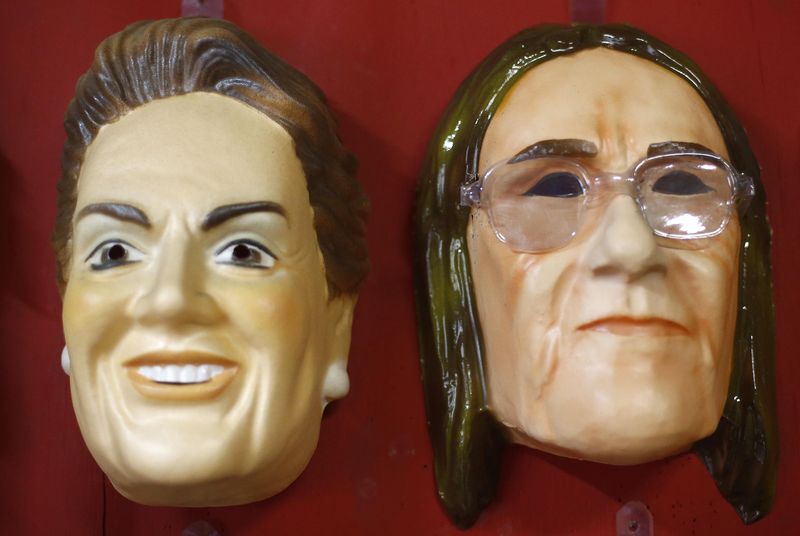Investing.com’s stocks of the week
By Jeb Blount
RIO DE JANEIRO (Reuters) - Investors betting that a long-awaited management change at Brazil's Petrobras will result in a swift rebound of the state-run oil company's fortunes are likely to be disappointed.
Even with changes at the top, there is little sign that Petroleo Brasileiro SA, as the company is formally known, will quickly recover from Brazil's largest-ever corruption scandal. The personnel changes will also mean little if the government of President Dilma Rousseff fails to ease up on political interference in the company or recognize the full extent of its problems.
Preferred shares of Petrobras are up 24 percent so far this week, largely on the expectation that Chief Executive Officer Maria das Graças Foster would step down.
Petrobras announced the departure of Foster and five other senior executives, including Chief Financial Officer Almir Barbassa and exploration chief José Formigli, in a terse note early Wednesday. The resignations came well ahead of an expected late-February departure date and took a government that wanted more time to find replacements by surprise.
But it will take more than a new CEO to extract Petrobras from a multibillion-dollar price-fixing, bribery and political kickback scandal. Serious change will require action from the company's real boss, President Rousseff, who was chairwoman of the Petrobras board from 2003-2010 and remains closely involved in its affairs.
Between her time on the board and as Brazil's president, Rousseff has directed Petrobras during a 12-year period notable for giant oil discoveries but also for soaring debt, cost overruns, missed production targets and project deadlines.
It was also a period in which some Petrobras executives engaged in systematic overpricing and bribery with engineering firms and other suppliers, prosecutors say. Both Rousseff and Foster deny any knowledge of the scam, and neither has been charged with any wrongdoing.
The investigation into Petrobras has helped push down the company's share price by nearly 60 percent since September, forcing it to scale back investments and hampering its ability to raise money. Turning that around will be a daunting task for any CEO.
"We do not believe that replacing Foster will necessarily bring an end to all of Petrobras' problems," said Leonardo Alves of Votorantim Corretora, a brokerage in Sao Paulo. "The new CEO will have to deal with almost the same problems that Foster has been dealing with: corruption scandals, high leverage ratios and difficulty accessing capital markets."
FOSTER UNDER PRESSURE
Foster appears to have been pressured by Rousseff and members of her ruling Workers' Party to leave Petrobras because she was too ready to acknowledge the company's problems.
On Jan. 23, Foster and other top executives and board members agreed to write off more than 61.4 billion reais ($23 billion) of investments tainted by corruption and business decisions that didn't pan out, a source with direct knowledge of board actions told Reuters last week.
Four days later, at Rousseff's request, board Chairman and former Finance Minister Guido Mantega vetoed the writedown because it threatened to give the impression that the government and Petrobras were corrupt, the source said, speaking on condition of anonymity.
After that, it seemed it was only a matter of time before Foster would step down or be forced out. On Tuesday, Rousseff asked Foster to stay on to the end of the month until a replacement could be found, according to a government source, who also spoke on condition of anonymity.
But Foster and her closest lieutenants decided not to wait.
"The resignation came as a surprise to us," Gustavo Gattass, an oil analyst with Banco BTG Pactual in Rio de Janeiro, said in a note to clients. "We'd approach Petrobras with more caution today than we did before."
Failure to take the writedown will also keep Petrobras, the world's most-indebted and least-profitable major oil company, out of capital markets for at least three more months. It has also caused work to slow to a crawl on many key projects and forced it to cut spending by as much as 30 percent in 2015.
"What is clear from the no-write-down debacle is that they still think they can sweep this under the rug," said a senior oil executive who works in direct partnership with Petrobras.
The source, who asked for anonymity because speaking openly could make working with Petrobras difficult, has little expectation that Foster will be replaced by a respected oil-industry professional and be free to fight corruption.
EXECUTIVE CANDIDATES
Jose Carlos Grubisich, former head of chemical company Braskem; Henrique Meirelles, former president of Brazil's central bank; Rodolfo Landim a former Petrobras and OGX executive; former Vale SA CEO Roger Agnelli and the mining company's current chief, Murilo Ferreira, are among the executives named in Brazil as possible replacements.
"I have no idea at all on who might get the job," the executive added. "I am sure only that it will be someone that Rousseff's Workers' Party can trust, which isn't someone who can fix the problems."
Change now rests with a board of directors, which Petrobras said will choose a new senior management team on Friday. That is the same board that nixed the writedown two weeks earlier.
Most of the new executives are expected to come from within the company, an executive with direct knowledge of the changes happening at the Petrobras told Reuters.
One of the two Petrobras senior managers who did not resign on Wednesday is Jose Eduardo Dutra, one of the Workers' Party's most powerful political dealmakers.
A former Petrobras CEO himself, Dutra now controls the corporate affairs and services division, the Petrobras unit that handles the bulk of the company's contracting and project management and that has been at the center of corruption investigations for years.
($1 = 2.70 Brazilian reais)
